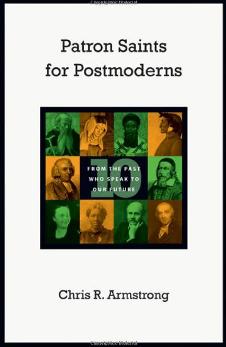
Well, it really exists now. My first book (beyond the dissertation, which is a whole different animal). It’s called Patron Saints for Postmoderns (InterVarsity Press), and it was midwifed by my unfailingly patient and encouraging editor, Cindy Bunch. I will spare readers the usual excited yelps and smug self-back-patting of the first-time author. But CT editor and co-blogger David Neff has invited me to talk a bit about the book this week, so I will.
David said I might ask and answer a question like this: Why do postmoderns need saints?
Well, many of us may not feel like it (many of my students don’t), but we’re all postmoderns, I suppose: We live in a secularized age in which all traditions, commitments, codes of life have been exploded and the bits lie scattered over our psychic landscape. The church hasn’t escaped this holocaust of traditions either, of course, and our church lives have a ramshackle, cobbled-together feel too.
This is one reason, I think, that a small but growing group of young Christians have found the Reformed theological system so attractive. There is comfort in its intellectual coherence, even seamlessness.
I have to confess my own sympathies lie in another direction. For me, it is enough that all things cohere in Christ. I don’t ask to understand how they do. But I do need reassurance that they do. On days when I get up and I have a sinus headache, the bills have piled up, my kids need school supplies that I can’t afford, the words of a recent argument with my wife ring in my ears, and I just don’t feel ready to live out another day, let alone praise God, a theological explanation of Romans 8:28 just won’t do it. Systematic theologians have an important job. (I have to say that: some of my best friends and colleagues are theologians!) But it’s not one I usually feel the need for in my gut, and it’s certainly not one I feel well-suited to do myself.
Where my own existential need lies is in the area, not of intellectual coherence, but of something like “practical” coherence. I need to be reminded repeatedly that my chosen faith has integrity not so much as a thought-system, but as a way of life. And the only way I know to receive that life-giving reminder is through the stories of those both today and long ago who have lived with God—as Paul would say, the “saints.”
I remember as a young Christian attending the Sunday worship service and charging up the faith engines—then becoming progressively unhinged from my faith through the week. What brought me back and energized me without fail was being at a home group or running into someone at a restaurant and hearing one of my new brothers or sisters talk about what God was doing in their lives. Wow. Nothing sorted me out faster.
* * *
I can hear the objection now: what do you need the stories of saints for if you’ve got the Bible?
Well, one answer to this, of course, is that Scripture itself belongs—at least in many of its parts—to this realm of stories. Its 66 books are filled with a riot of tales (true tales!), and those tales have been formative for the historic faith. They ring true to reality in deep ways, and our own stories ring truest when they resonate with them.
But it’s hard, as Dorothy L. Sayers discovered when she set out to rewrite Christ’s life in her stirring serial radio drama The Man Born to Be King, to scrape from the Bible’s stories their encrusted, 2,000-year-old shells of sentimentality, ecclesial coercion, ethical guilt-mongering, theological bludgeoning, and simple ennui-by-overuse. To truly connect with the Bible, especially for those who have spent some years in the faith, seems often to demand some perspective-changing experience or new “filter.”
I am reminded of the testimony of many who were touched by the charismatic renewal in America: their electrifying experiences in the Spirit had as much variety as the Spirit himself. Their own stories were being invaded and changed in radical, life-changing ways that differed radically from person to person. But along with this variety almost always came a common-denominator phenomenon: a new vibrancy in their reading of Scripture. The Spirit, whom they now met in startlingly direct ways, also held out the Word anew and illuminated its reading. Hmmm. Come to think of it, that’s just what Mr. Calvin said would happen . . .
Well, the Spirit comes in many guises and many forms, and I’ve convinced the number one reason why the church always treasured her saints was because their stories made The Story of creation, redemption, and eschatological fulfillment come alive again. The saints’ lives served as amplifiers for The Word. Or to put a sharper point on it: people’s stories meet us in a way analogous to the way Christ himself met us in his brief earthly life—they incarnate spiritual truth in human lives. Yes, yes, I know: there has only ever been one Incarnation. But Paul himself talked in incarnational terms about the church: the church (the saints) = “the body of Christ” in history.
I won’t claim anything so grandiose for the stories I tell in Patron Saints for Postmoderns. But if the Spirit brings Christ more sharply into focus for those who read the lives of Antony of Egypt, Gregory the Great, Dante Alighieri, Margery Kempe, John Amos Comenius, John Newton, Charles Simeon, Amanda Berry Smith, Charles M. Sheldon, and Dorothy Sayers, then I will feel I’ve done something more than shore up my own postmodern doubts. What I really hope for readers is that as they encounter the varied and fascinating people described in this book, they will be drawn, in ways as diverse and wonderful as their own personalities, to follow these ten saints as they themselves followed Christ.








